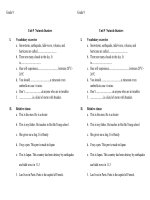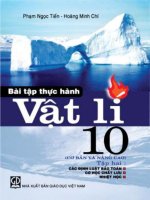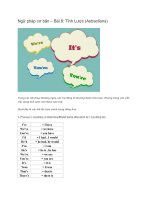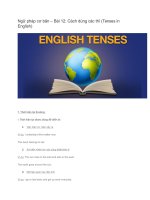Ngu Phap co ban + bai tâp thuc hanh
Bạn đang xem bản rút gọn của tài liệu. Xem và tải ngay bản đầy đủ của tài liệu tại đây (314.86 KB, 29 trang )
Subject pronouns
I you he she it we you they
Object pronouns
Me you him her it us you them
• The subject is the person or thing doing the action:
/ left early.
She went home.
We said goodbye.
• The object is the person or thing
receiving the action:
She telephoned me.
I hit him.
We saw
Practice
Write the correct pronouns for these sentences.
1 ..She... telephoned yesterday, (she)
2 We watched .him... for hours, (he)
3 Hasn't…….. arrived yet? (she)
4 …………..don't understand. (I)
5 Are you talking to ……..? (I)
6 Don't ask…… ……. doesn't know, (she/she)
7 This is Julia: ………have known for years, (we/she)
8 Nobody told……. the bus was leaving, (they)
9 Why didn't ……..ask…….. to come? (she/they)
10 Don't ask……… ……. ask (I/he)
11 ……..think …….doesn't like (I/He)
12 …….asked …….to invite ………(they/he/we)
Practice
Write the correct possessive adjective or pronoun for these sentences.
1 Whose camera is this? Is it ..yours. ? (you)
2 Excuse me, those are ,.our.. seats, (we)
3 Is it ………suitcase or…….siutcase ? (you/he)
4 Has the dog had ……..food? (it)
5 They're not …….keys - they're ……..keys (I/she)
6 I don't think its room…….room: I think it's ……..room (you/they)
7 The police asked me for ………address. (I)
8 Have you got ……pen, or would you like to borrow……..pen ? (you)
9 …….garden is bigger than…….garden . (they/we)
10 I think this is ……book. Oh no, it's …….book.(I/you)
12 The cat wants ……dinner, (it)
13 You know it's not …….money. It's…….money. (you/I)
14 It isn't …….car, it's ……..car (he/she)
15 It wasn't ……..mistake, it was………mistake (I/they)
16 Have you met ……..mother? (they)
17 ………parents say the decision is ……..(she/they)
18 …….brother hasn't got a phone, so he uses ……….phone.(I/we)
19 ……..car wasn't working, so I used………car. (I/he)
20………. house is smaller than ………house .(we/they)
Rewrite these sentences, putting the apostrophe (') where necessary. If two
answers are possible, write the more likely one.
1 We talked to the boys parents for some time.
We talked to the boys' parents for some time.
We talked to the boy's parents for some time.
2 We can borrow my fathers car.
We can borrow my father's car.
3 Have you met Susans friend?
4 About sixty people use the teachers room.
5 Someone had taken Barbaras purse.
6 Something was hurting the animals foot.
7 I'm going to write to the childrens parents.
8 Jane works in my mothers office.
9 The dog doesn't like its food.
10 Mary and Pat stayed at their friends house.
11 Are you going to the secretaries meeting?
12 I put the money in the waiters hand.
13 lans suit was very expensive.
Practice
Write 'C for countable, 'U' for uncountable.
apple
water
boy
milk
table
pen
bread
cup
computer
information
butter
sugar
tree
garden
book
news
bus
wine
house
money
cheese
tooth
car
grass
person
road
chair
bicycle
hand
flour
Practice
Write the plurals.
Brother box
Baby sister
match person
man
child
secretary
student
bus
cinema
foot
boy
table
window
banana
key
camera
church
teacher
garden
sandwich
door
lady
gentleman
tooth
restaurant
house
brothers woman
box
baby
person
man
child
secretary
person
man
child
secretary
student
bus
cinema
foot
boy
table
window
banana
sister
match
key
camera
church
teacher
garden
sandwich
door
lady
gentleman
tooth
restaurant
Write a, an, or nothing to complete these sentences .
1 I'd like ..a.. sandwich, please.
1 He asked me for ..-.. money.
3 They wanted …….information about the trains.
4 I'd like ……..apple and orange, please.
5 They've got ………very big house.
6 Do you like……. fast cars?
7 We watched ……films all afternoon.
8 Have you got ……..umbrella?
9 I asked for………. bread and cheese.
10 Are you drinking milk?
11 I had ….glass of water.
12 He gave me ……orange.
13 Is there …….telephone here?
14 We had …….eggs for breakfast.
15 I like ………coffee and tea.
Practice
Write a, the, or no article to complete these sentences.
1 She's .a... journalist.
2 ..The.. moon moves slowly round the... earth.
3 sun is shining.
4 I'd like …….cup of coffee, please.
5 Have you got …….double room?
6 He gave me a lighter and some cigarettes but…….. lighter
didn't work.
7 There was ………doctor and nurse in the room
………nurse was sleeping.
8 She took ……sandwich and piece of cake, but didn't eat…..
cake.
9 Yes, I work at this school. I'm …….teacher.
10 A man and two women were sitting in the car. 1 think …..man
was Italian.
11 Did you see ………Pope when he came to England?
12 He offered me …….cigarette, but I refused.
13 Did you send me …….postcard when you were in Greece?
14 They had six cats and ……….dog. T really liked …….dog.
15 Have you got …….match, please?
16 She sent me… letter and …..card .
17 I had …….cup of tea and ………ice cream tea was terrible.
18 Have you met Sally? She's …….friend of mine.
Practice
Complete the sentences with a, an, some or any.
1 Would you like..a.. cup of tea?
2 There's some.. butter in the fridge.
3 Can I make ………telephone call?
4 There weren't ……books in the house.
5 There are……. children at the door.
6 She wants ……..glass of water.
7 They don't have…… friends in the village.
8 I bought ………lemonade yesterday.
9 Have you got……… watch?
10 She'd like …….new perfume.
11 We're getting …….new car soon.
12 There isn't ……shampoo in the bathroom.
13 I'd like……. apple, please.
14 The house hasn't got ……..furniture.
15 Would you like …….orange juice?
16 I've got…….. bananas and apple.
17 Did you bring……….. bread?
18 I'd like ……….water, please.
19 Sorry, I haven't got ……….matches.
20 I asked the waiter for………tea.
23 too, enough
• The infinitive with to is often used after too + adjective, or not +
adjective + enough.
It's too cold to swim today. (We can't swim today - it's too cold.)
It isn't warm enough to go to the beach. (We can't go to the beach
- it's not warm enough.)
Practice
Complete these sentences using too or not ... enough.
1 I can't walk any further - I'm ..too tired... (tired)
2 I'm sorry. You're .not old.enough to see this film. (old)
3 It's to work here. Let's go to the library.
[noisy)
4 Ian was to get into the swimming team.
(fast)
5 Your handwriting is to read, (small)
6 I'm afraid we can't buy that computer. It's
(expensive)
7 I don't think George should get the new job - he's
(efficient)
8 Those jeans are to wear to the party.
(dirty)
9 We couldn't talk to each other in the pub - the music was
(loud)
10 Can you help me with this bottle? I'm to
open it. (strong)
24 Participial adjectives (bored/boring)
CONTRAST
• Note the difference:
I was bored.
The lesson was boring.
It is not possible to say: The lesson was bored.
It is possible to say: She was boring.
Practice
Circle the correct word in each sentence.
1 It was a very [interested^ performance.
2 We were all very 'interesting) in what he said.
3 It was a very {tired/tiring) journey.
4 We were all very [worried/worrying).
5 The children are [frightening/frightened) by the animals.
6 Why do you look so {bored/boring) at school?
7 It was a terribly [excited/exciting) day.
8 Don't look so [worrying/worried).
9 We had a [tiring/tired) trip home.
10 It was an extremely {amused/amusing} programme.
11 It was an [exciting/excited) idea!
12 It was the most [boring/bored) lesson I can remember.
13 We were all feeling (tired/tiring),
14 Didn't you think it was an {amused/amusing) play?
15 The last half hour was a [worrying/worried) time.
16 I've never been so [frightened/frightening) in my life.
Adverbs of manner
• Adverbs of manner are formed from adjectives by adding ly:
quick --> quickly; polite —> politely; careful —• carefully
• Note these irregulars: good -> well; hard -> hard; fast --> fast; early --> early;
late --> late; loud --> loud or loudly.
He's a good worker. He works well.
She's a hard worker. She works hard.
She's a fast runner. She runs fast.
Practice
Write the adverbs.
quick
slow
fast
careful
stupid
quickly clever
nice
bad
intelligent
polite
rude
brave
early
dangerous
good
hard
Present Simple
• There is only one form of you in English, which is the same in singular
and plural.
• Note the endings with he, she, and it. If the verb ends in ss, sh, ch, or x,
add es:
He finishes {finish ends in sh)
She watches (watch ends in ch)
USE
• For something which is permanently true:
I come from France.
He doesn't speak Spanish.
We live in London.
• For repeated actions or habits:
1 get up at six o'clock every day.
What time do you leave work?
I don't see them very often.
Practice
Rewrite each sentence as a positive or negative sentence, or a question,
according to the instructions.
1 I visit my parents very often, (negative)
/ don't visit my parents very often.
2 Does he go to school every day? (positive)
He goes to school every day.
3 She comes from Germany, (question)
Does she come from Germany?
Verbs
4 She goes to work by car. (question)
5 We watch television every night, (negative)
6 He doesn't walk to work every day. (positive)
7 She plays football every Saturday, (question)
8 He washes his car every week, (question)
9 They live in Australia, (question)
10 They go to school by bus. (question)
11 Does she finish work at five o'clock? (positive)
12 He goes to the cinema on Fridays, (question)
13 I come from Africa, (negative)
14 Does he live in this street? (positive)
15 He works in a restaurant, (question)
16 She gets up at five o'clock, (question)
17 They eat a lot. (negative)
18 Does he work here? (positive)
29 Present Continuous
Negative with not Negative with n't
USE
• For an action in progress now:
I'm reading a grammar book now.
What are you looking at?
She isn't eating at the moment.
Practice
Rewrite each sentence as a positive or negative sentence, or a question,
according to the instructions.
1 She's watching television now. (question)
Is she watching television now?
2 He isn't staying at this hotel, (positive)
He's staying at thle hotel.
3 She's reading, (negative)
She isn't reading.
4 They're working, (question)
Verbs
5 He's writing a letter, [question)
6 He's eating, (negative)
7 I'm not working, (positive)
8 She's studying at the moment, (question)
9 I'm sleeping, (negative)
10 You're reading my newspaper, (question)
11 She's writing a letter, (question)
12 He's talking to Mary, (question)
13 They're not playing football, (positive)
14 He's listening to the radio, (question)
15 You're playing with my football, (question)
30 Present Simple/Present Continuous
Practice -
In your notebook, write these sentences putting the verbs into the correct tense.
1 She (read) at the moment.
She's reading at the moment.
2 (You go) to work by car?
Do you qo to work by car?
3 I (not watch} television every night.
/ don't watch television every night.
4 I (not watch) television at the moment.
I'm not watching television at the moment.
5 We {see] our parents every week.
6 (You listen) to the radio now?
7 I (not get up) at seven o'clock every morning.
8 Peter (talk) to Susan now.
9 (They work) in the restaurant at the weekends?
10 She (listen) to the radio in her bedroom at the moment.
11 They (not come) to school every day.
12 (You work) now?
13 The children (go) to bed at eight o'clock.
14 1 (leave) the office every day at five.
15 I'm sorry i can't talk to you now. I (go) out.
16 (Peter and Jane work) in London at the moment?
17 (Mary and Susan drive) to the office every day?
18 We (go) to the beach now.
19 (John listen) to the radio at the moment?
20 (Your parents sit) in the garden now?
21 The film (start) every night at eight o'clock
22 They (not go) to the cinema very often.
23 (You go) into the office every month?
24 I (not study) at the moment.
Present Continuous: short answers
FORM
Positive Negative
Verbs
Notes
• Nouns —• pronouns.
'Are your parents sleeping?'
'Yes, they are.'
• Positive short answers do not use contractions:
Yes, 1 am. (NOT Yes, I'm)
Yes, they are. (NOT Yes, they're)
• Contractions are used in negative short answers.
7s she working?'
'No, she isn't'
Practice
Someone is asking you questions. Write the short answers.
1 'Are you working at the moment?' 'No, '
2 'Are your sislers working now?' 'No, '
3 'Are your parents coming?' 'Yes '
4 'Is John working at the moment?' 'Yes, '
5 'Are they playing tennis?' 'No, '
6 'Are you reading this book?' 'Yes, '
7 'Is Mary going to school today?' 'No, '
8 'Is Peter listening to the radio?' 'Yes, '
9 'Are they doing their homework now?' 'No, '
10 'Is the dog sleeping?' 'Yes, '
Present Simple: short answers
FORM
Positive Negative
Notes
• Nouns * pronouns
'Do the men want some tea?
'Yes, they do.'
• Negative short answers can use the
unconnected form:
No, they do not. (this is more emphatic)
Practice
Write the short answers.
1 'Do you live here?1 'Yes, '
2 'Does Mary work in this office?' 'No, '
3 'Does Stephen speak French?' 'No, '
4 'Do the teachers like your work?' 'Yes, '
5 'Do you understand the lessons?' 'No, '
6 'Do they visit you often?' 'No '
7 'Do you like France?1 'Yes, '
8 'Do your parents live in London?' 'Yes, .'
9 'Does your father like modern music?' 'No, '
10 'Does Judy drive to work?1 'Yes, .'
11 'Do your grandparents still enjoy gardening?' 'Yes, '
12 'Does Simon's sister work with you?' 'No, .'
13 'Do John and Alison eat meat?' 'No, '
14 'Docs Tony like adventure films?' 'Yes, '
15 'Do you watch TV at the weekend?' 'No, '
16 'Does your uncle play tennis?' 'Yes .'
Someone is asking you questions. Write the short answers.
1 'Are your brothers working today?' 'Yes,
2 'Do you speak Italian?' 'No,
3 'Do you like this school?' 'Yes, '
4 'Do you go to school in London?' 'Yes, '
5 'Is your mother watching television?1 'Yes, '
6 'Do you go to school on Sundays?' 'No, '
7 'Are your parents staying here?' 'No, '
8 'Does the dog sleep in your bedroom?' 'No, '
9 'Do you get up at eight o'clock?' 'Yes, '
10 'Is Mary listening to the stereo?' 'Yes '
11 'Does the film start at six o'clock?' 'No, '
12 'Are the children playing football?' 'Yes, '
13 'Does Susan drive to work?' 'Yes '
14 Are you reading?' 'No, '
15 'Am I reading your paper?' 'Yes, '
16 'Are they doing the washing up?' 'Yes, '
17 'Do you come to work by bike?' 'No, '
18 'Is John watching television?' 'No, '
19 'Does Paul swim for the school team?' 'Yes, '
20 'Am I sitting in the right place?' 'Yes, '
21 'Do you like reading poetry?' 'No, '
22 'Do we need our coats?' 'No, '
23 'Are Anne and Maria waiting for the bus?1 'Yes, '
24 'Are you enjoying yourself?' 'Yes, '
25 'Is she coming now?' 'No, '
26 'Does he know London well?' 'No…….
Present Simple and Continuous: short forms
Check
Someone is asking you questions. Write the short answers.
1 'Are your brothers working today?' 'Yes,
2 'Do you speak Italian?' 'No,
3 'Do you like this school?' 'Yes, '
4 'Do you go to school in London?' 'Yes, '
5 'Is your mother watching television?1 'Yes, '
6 'Do you go to school on Sundays?' 'No, '
7 'Are your parents staying here?' 'No, '
8 'Does the dog sleep in your bedroom?' 'No, '
9 'Do you get up at eight o'clock?' 'Yes, '
10 'Is Mary listening to the stereo?' 'Yes '
11 'Does the film start at six o'clock?' 'No, '
12 'Are the children playing football?' 'Yes, '
13 'Does Susan drive to work?' 'Yes '
14 Are you reading?' 'No, '
15 'Am I reading your paper?' 'Yes, '
16 'Are they doing the washing up?' 'Yes, '
17 'Do you come to work by bike?' 'No, '
18 'Is John watching television?' 'No, '
19 'Does Paul swim for the school team?' 'Yes, '
20 'Am I sitting in the right place?' 'Yes, '
21 'Do you like reading poetry?' 'No, '
22 'Do we need our coats?' 'No, '
23 'Are Anne and Maria waiting for the bus?1 'Yes, '
24 'Are you enjoying yourself?' 'Yes, '
25 'Is she coming now?' 'No, '
26 'Does he know London well?' 'No, '
27 'Do they like chicken?' 'Yes, '
THE PAST TENSE
34 Past Simple: question and negative
Practice
Write these sentences in the past simple, keeping them as questions or negatives.
1 Do they agree? Did they agree?
2 They don't drive. They didn't drive.
3 When do they go?
4 Where do they work?
5 Do you understand?
6 I don't know
7 He doesn't like it
8 What do you think?
9 She doesn't live here
10 How much does it cost?
11 When do you get up?
12 1 don't swim
13 She doesn't speak Spanish
14 We don't understand
15 When do they leave?
16 When does he go to school?
17 Do you like Germany?
18 When do you go out?
19 She doesn't smoke
20 He doesn't know
35 Past Simple: positive - regular verbs
FORM
• Regular verbs have the same form for all persons (I, you, he, she, etc.):
Notes
• Irregular verbs are different in the positive >• Exercise 36.
• Remember to use the infinitive without ed for questions and negatives
Exercise 34.
Did you stay? (NOT Did you stayed?)
• Spelling:
a) verbs ending in e add only d:
I love — / loved
b) verbs ending in y change y to led:
I try — I tried
c) most verbs ending in a single vowel + single consonant change to single
vowel + double consonant:
/ travel —• travelled
We stop —• we stopped
I
He
She Infinitive + ed
It We
You
They
stayed.
USE
• For a past action or state. The action can be a short one:
/ asked a question.
She missed the bus.
Practice
Change the verbs into the past simple, keeping them as positives, negatives,
or questions.
1 He lives here. He lived here.
2 Do you work here? Did you work here?
3 I don't like the film
4 She hates the hotel
5 We don't live there
6 Does he play the piano?
7 I love Paris
8 He doesn't work very hard
9 She travels a lot
10 He walks everywhere
11 I don't study English
12 Do you drive to school?
13 I don't like him
14 Do you miss your parents?
15 We love Spain
16 John studies music
17 Where do you live?
18 What does he study?
19 Where does she work?
20 We don't like London
21 They hate waiting
22 They work in a factory
40
or a long one:
/ walked for hours.
I lived here for years.
Verbs
36 Past Simple: positive - irregular verbs
FORM
• Irregular verbs have the same form for all persons (I, you, he, she, etc)
Subject
I
He
She
It We
You
They
Past Simple
went.
• Irregular verbs are irregular in the past simple in the positive only (not in the
negative or question form):
go — went She went home yesterday,
sit — sat I sat down,
write -- wrote She wrote for hours.
go— went
sit-- sat
come— came
write-- wrote
run— ran
give -- gave
have -- had
get up -- got up
eat -- ate
drink — drank
Practice
Use the verbs above to complete these sentences.
1 I .wrote... a few letters yesterday.
2 He …….at six o'clock this morning.
3 They …….home late last night.
4 She …….a headache yesterday.
5 I was hungry so I……..some bread and cheese.
6 They came into my office and…….. down.
7 We …..some water.
8 I was late so I …….to work.
9 She ………abroad last week.
10 They …….him some money.
Write the past simple positive of these irregular verbs.
buy bought
catch
choose
come
do
drink
eat
forget
give
go
know
make
put
read
see
sit
speak
take
tell
think
understand
In your notebook, write these sentences putting the verbs into the past
simple. Remember that the infinitive is used for questions and negatives.
1 I some new clothes last week, (buy)
/ bought some new clothes last week.
2 What time last night? (they come)
What time did they come last night?
3 I his question, (not understand)
/ didn't understand his question.
4 I he was wrong, (think)
5 a lot at the party? (you eat)
6 I the bus this morning, (not catch)
7 I my keys yesterday, (forget)
8 you about the meeting? (they tell)
9 Peter the washing-up last night, (do)
10 They anything at the disco, (not drink)
11 I your suitcase in your bedroom, (put)
12 We it was your birthday, (not know)
13 to the office yesterday? (you go)
14 They her a present when she left, (give)
15 We their letters, (read)
Past Continuous
USE
To describe a past action at some point between its beginning and its end.
The past continuous is often interrupted by the past simple.
I was having a bath when the phone rang.
John arrived when I was eating.
I was listening to the radio when I had an idea.
We were playing tennis at 7 o'clock last night.
Note the difference between:
a) When she arrived, we had dinner.
b) When she arrived, we were having dinner.
The time order for (a) is arriving then having dinner.
The time order for (b) is having dinner, during which she arrived.









